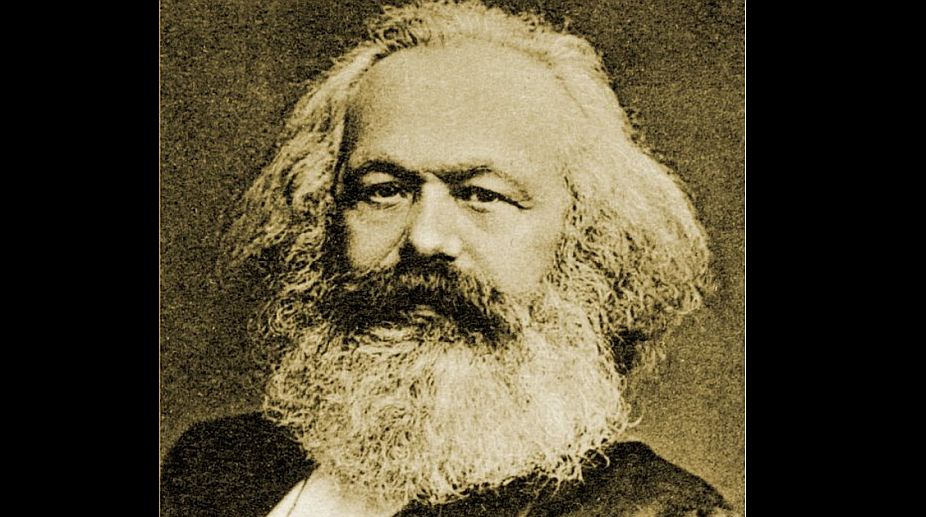Karl Heinrich Marx (1818-1883) was the last of the great critics in the Western intellectual tradition. His ideas exerted a decisive influence on all aspects of human endeavour, and transformed the study of history and society. They significantly changed anthropology, the arts, cultural studies, history, law, literature, philosophy, political economy, political theory and sociology by establishing a link between economic and intellectual life.
By developing a theory of praxis, i.e. unity of thought and action, Marx brought about a sea change in the entire methodology of the social sciences. However, from its very inception Marxism had to countenance criticism and critical acclaim. In fact, the controversies within Marxism are such that Marxism, like Liberalism, has become an umbrella ideology.
Advertisement
In the context of Marx’s writings, scholars spoke of two Marx ~ the young and the old. The young Marx was concerned with alienation, human nature and morality; the old was more deterministic, with his in-depth study of the workings of capitalism. The link between the two was the Grundrisse (1857-1858) and the Introduction to the Critique of Political Economy (1859).
Another crucial fact was that four of Marx’s writings were written in collaboration with Friedrich Engels (1820-1895), his friend and comrade. After Marx’s death, Engels edited and published some of his works as Marx’s disciple raising questions about how much of it was Marx’s original, and what were interpretrations of Engels.
It is generally believed that Marx generalised on the basis of events, i.e. from the particular to the general. Engels on the other hand, according to Carver was more deterministic, analysing from the general to the particular.
Engels acknowledged Marx as a genius, while, at best, he was talented. Marx was an innovator, and Engels the “popularizer”.
Gareth Stedman Jones convincingly comments that Marxism as a codified doctrine was Engels’ achievement. The latter made it palatable for Communist parties who were not interested in following the dense text of Marx. It was Engels who drew the parallel between Marx and Darwin.
To comprehend the major thrust of Marx’s political philosophy that aimed at human liberation, it is important to consider the significant shift that occurred in the late 17th century when traditional analysis of the political order based on scarcity was replaced by a philosophy of abundance.
This meant, as pointed out by Arendt, that poverty and disparities once seen as natural, inherent and inevitable were now considered manmade and hence could be solved. The liberal writings of Locke and Jefferson reflected this libertarian dimension. However, the failure of early liberalism, according to Watkins to fulfil its own promise, led to the crystalisation of socialist ideas.
The liberal theory hinged on two principles ~ politics as involving non-coercive solutions to antagonistic interests, and the importance of democratic methods as being effective in making these adjustments.
Though it took cognisance of the Hegelian critique of individualism, it did not accept two of its major assumptions. The first was that society moved, balancing the antithetical forces which generated social change by their schisms and strife, and second, that social history was inherent in the very forces that generated them.
These aspects of Hegelian philosophy played a pivotal role in the political theory of the 19th century, and later primarily due to the transformation brought about by Marx.
Conflict played a crucial role in both Hegelian and Marxist political theory, thereby ruling out peaceful adjustment for the mutual advantage of the contending parties.
Marx interpreted liberalism and classical economics as articulating and defending the interests of the middle class. He proposed to create a social philosophy that was in tune with the aspirations of the rising proletariat.
Like Hegel, he looked upon the French Revolution as an indication of the demise of feudalism. But while Hegel contended that the Revolution would culminate in the emergence of nation-states, Marx looked upon it as a prelude to a more fundamental and total revolution beyond the nation-states.
The French Revolution, which brought the middle class to the forefront with the destruction of the nobility, was essentially a political revolution.
The next step to be undertaken was a social revolution which would be brought about by the proletariat. Francois Noel Gracchus Babeuf (1760-1797) was the first to highlight the contradictions within the revolutionary slogans of liberty and equality. He advocated socialisation of industry and land
to complete the Revolution that began in France in 1789.
Socialism carried forward the Libertarian element of early Liberalism in its call for total human emancipation. Marx disparagingly dubbed the Socialists who preceded him as “Utopians”, for their emphasis on class harmony and non-revolutionary politics.
The label “Utopian socialists” was first used by Jerome Blanqui in the History of political economy (1839). Marx learnt a lot from these Utopian socialists, and borrowed more of their ideas than he ever cared to admit. The relationship between the early Socialists and Marx was like the one that Plato shared with the Sophists. Like Marx, Plato disparaged sophism, but was indebted to its ideas.
Marx described his socialism as “scientific”. Having studied the laws of social development and of capitalism, he sought to prove that the destruction of capitalism was inevitable, for it had given rise to its own “grave diggers”.
Marxism’s dream of creating a classless society beyond conflict and based on equality remained illusory. However, its critique of exploitation and alienation, and the hope of creating a truly emancipated society that would allow the full flowering of human creativity, would continue to be a starting point of any Utopian project. Despite Marx’s Utopia being truly generous, it displayed a potential for being tyrannical, despotic and arbitrary. Centralisation of power and absence of checks on absolute power were themselves inimical to true human liberation and freedom.
Bakunin’s critique that the dictatorship of the proletariat would degenerate into a dictatorship on the proletariat was prophetic. Camus viewed Marxism as a historical religion that replaced god with history and eternal salvation with an earthly paradise. Such a utopian scheme inevitably, ended as Koestler said, as “a God that failed”. But despite such serious limitations, Marx was a brilliant critic of 19th century economics and politics.
(The writers are respectively former Professor, Department of Political Science, University of Delhi, and Associate Professor in Political Science, Jesus and Mary College, Chanakyapuri, New Delhi.)











